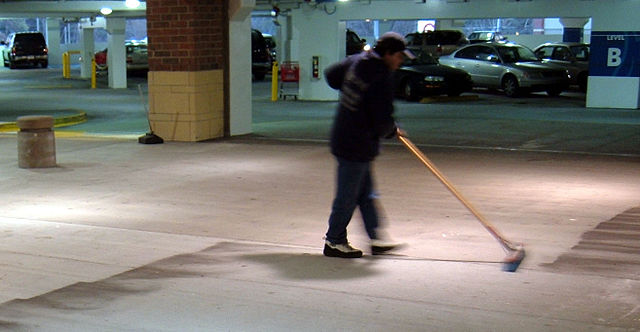Loading AI tools
Person who cleans From Wikipedia, the free encyclopedia
A cleaner, cleanser or cleaning operative is a type of industrial or domestic worker who is tasked with cleaning a space. A janitor (US and Canada), also known as a custodian, porter or caretaker, is a person who cleans and might also carry out maintenance and security duties. A similar position, but usually with more managerial duties and not including cleaning, is occupied by building superintendents in the United States and Canada and by site managers in schools in the United Kingdom.


According to the Cambridge English dictionary a "cleaner" is "a person whose job is to clean houses, offices, public places, etc.:";[1] the Collins dictionary states that: "A cleaner is someone who is employed to clean the rooms and furniture inside a building."[2] However, a cleaner does not always have to be employed and perform work for pay, such as in the case of volunteer work or community service. "Cleaner" may also refer to cleaning agents e.g. oven cleaner, or devices used for cleaning, e.g. vacuum cleaner.[2][3]

Cleaning operatives may specialize in cleaning particular things or places, such as window cleaners, housekeepers, janitors, crime scene cleaners and so on.[4] Cleaning operatives often work when the people who otherwise occupy the space are not around. They may clean offices at night or houses during the workday.
The word janitor derives from the Latin "ianitor",[5] meaning doorkeeper or porter, itself from "ianua", meaning door, entrance or gate.[6] This derives from "Janus", the Roman god of doors, gates and portals.[7]
Its first recorded use meaning "caretaker of a building, man employed to see that rooms are kept clean" was in 1708.[6]
Between 17% and 23% of the total illegal immigrant population living in the United States work in the cleaning industry[8] (and growing at a rate of 1/2% to 1/3% percent per year). In addition to this population offering an abundant source of inexpensive labor,[9] janitorial work is mostly undertaken at night, making it an appealing option for janitorial companies to employ illegal workers[10][11] seeking clandestine employment.
In the Netherlands, the number of cleaning companies grew from 5,000 in 2003 to 8,000 in 2008.[12]
According to the U.S. Bureau of Labor Statistics, in 2023 the median pay of a janitor working in the US was $16.84 per hour.[13]
Cleaning is one of the most commonly outsourced services.[14] Some of the reasons for this include:
The cleaning industry is quite big as different types of cleaning are required for different objects and different properties. For example, cleaning an office space requires the services of a commercial cleaner, whereas cleaning a house requires a residential cleaner or residential cleaning service. Depending on the task, even these categories can be subdivided into, for example, end-of-lease cleaning, carpet cleaning, upholstery cleaning, window cleaning, car cleaning services etc. Cleaners specialize in a specific cleaning sector or even a specific task in a cleaning sector, and one cannot expect a window cleaner to be able or willing to clean a carpet.
For example, according to International Standard Classification of Occupations and European Skills, Competences, Qualifications and Occupations, the profession of a cleaner can be divided into:[15]
In addition:
The cleaning person may receive waste and carry out activities related to its transport to the place of storage, segregation and recycling.
Cleaning can be done freely, free of charge and without employment e.g. social cleaning of the forest from garbage.
Cleaning is sometimes done by convicts for rehabilitation or leniency purposes. Cleaning as a substitute punishment. However, in the other hand in some cases, cleaners are checked against criminal records.[16]
Office cleaning staff perform many of the same duties as janitors. However the tasks are divided among different members. Additional tasks include:
Most of the work performed by janitors and building cleaners is indoors. Office and school buildings are usually cleaned when they are vacant, so most of the office janitorial staff work during the evening. The work can be physically taxing and sometimes dirty and unpleasant.[17] General janitor duties often include the following tasks:
The following are some items used by cleaning staff: However, the equipment depends on the situation and the type of cleaning.
in addition: ladder, rake, bags for leaves.
Not always, but depending on the situation, (for example during cleaning dusty or dangerous substances or places, window cleaning at high heights, being on a busy street or in factories) items used by cleaning staff can include safety equipment such as:
The exposure of a cleaner to hazards depends on the activity performed and the situation for example: allergens, dust, biohazards, fall, possibility of contact with electric shock, slipping on a slippery surface, so safety equipment should be adapted to the situation.
In addition: On the whole it is not recommended to perform this work for a person with severe allergies.
The 2000 film Bread and Roses by British director Ken Loach depicted the struggle of cleaners in Los Angeles, California, for better pay and working conditions and for the right to join a union. In an interview with the BBC in 2001, Loach stated that thousands of cleaners from around 30 countries have since contacted him with tales similar to the one told in the film.
Seamless Wikipedia browsing. On steroids.
Every time you click a link to Wikipedia, Wiktionary or Wikiquote in your browser's search results, it will show the modern Wikiwand interface.
Wikiwand extension is a five stars, simple, with minimum permission required to keep your browsing private, safe and transparent.